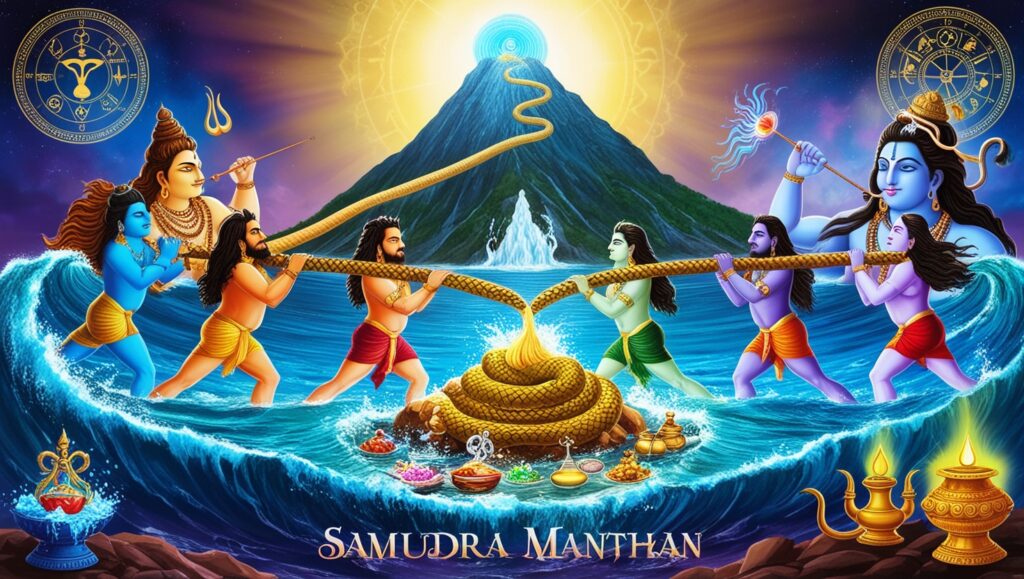In Hindu mythology, the story of the Samudra Manthan (Churning of the Ocean) is one of the most profound allegories symbolizing the eternal struggle between good and evil. This cosmic event, recounted in ancient texts like the Mahabharata and the Vishnu Purana, is rich with symbolism that holds a special significance not just in spirituality, but also in Vedic astrology.
Let’s explore the myth and its deep connections to Vedic astrology, followed by some practical insights that can help us in modern life.
The Story of Samudra Manthan
According to the story, the Devas (gods) and Asuras (demons) came together to churn the ocean to obtain the amrita, the nectar of immortality. However, this wasn’t an easy task. They used Mount Mandara as the churning rod and the great serpent Vasuki as the rope, and with Lord Vishnu’s guidance, began the process of churning the ocean.
As the churning began, various powerful substances emerged. The first was halahala—a deadly poison capable of destroying all creation. Lord Shiva, in his immense compassion, drank the poison, which turned his throat blue and gave him the name Neelkanth. As the churning continued, treasures like the wish-fulfilling tree (Kalpavriksha), divine gems, and ultimately the nectar of immortality appeared.
Finally, Lord Vishnu, taking the form of Mohini, ensured that the nectar went to the Devas, symbolizing the ultimate victory of good over evil.
Astrological Significance of Samudra Manthan
In Vedic astrology, the story of Samudra Manthan carries potent symbolism related to karmic struggles, spiritual evolution, and the cosmic play of opposing forces. Here are some key astrological insights:
- Karmic Churning: Just like the ocean was churned to reveal treasures and poison, Vedic astrology suggests that life is a process of karmic churning. Our birth chart, governed by planetary positions, represents the energies we must work with. The struggles we face, symbolized by the churning, bring out both the halahala (obstacles, pain) and the amrita (wisdom, spiritual growth).
- Practical Point: Difficult planetary transits (like Saturn’s Sade Sati or Mars’s return) often feel like the churning of the ocean. These times push us to confront our deepest fears, challenges, and hidden karmas. However, just like the treasures that emerged from the ocean, these periods also bring opportunities for transformation and growth. Stay resilient during tough transits—better outcomes lie on the other side.
- Shiva’s Role – Poison and Healing: Lord Shiva consuming the poison represents the power of endurance and self-sacrifice. In astrology, this is often related to the planet Saturn, which governs discipline, responsibility, and the ability to bear burdens.
- Practical Point: If you are experiencing tough Saturn influences in your chart (e.g., through Sade Sati or a Saturn return), take it as a period of spiritual purification. Like Shiva, who took the poison but emerged stronger, Saturn’s lessons are hard but rewarding. Practice patience, commitment, and mindfulness to weather these storms.
- The Balance of Opposites (Devas and Asuras): The cooperation of Devas and Asuras in the churning represents the interplay of positive and negative forces, both of which are necessary for evolution. In astrology, this duality is reflected in the nodes of the moon—Rahu (North Node) and Ketu (South Node). These two shadow planets represent our karmic lessons and past-life baggage.
- Practical Point: Rahu and Ketu transits in your chart reveal areas where life’s challenges can turn into blessings. Rahu often represents uncharted territories, where we crave progress but must overcome obsession. Ketu shows areas of past mastery but warns of detachment or apathy. Find the balance between ambition and contentment, just as the Devas and Asuras did.
- Vishnu’s Form as Mohini – The Art of Discrimination: When the nectar finally appeared, Vishnu, in the form of the enchanting Mohini, tricked the Asuras and ensured the nectar was given to the Devas. This act represents the need for wise discrimination and the skill of seeing through illusions—qualities often associated with Jupiter, the planet of wisdom and knowledge.
- Practical Point: In astrology, the planet Jupiter governs wisdom, higher learning, and moral guidance. Pay close attention to Jupiter transits in your chart, as they help you develop the power to discern between what is truly valuable (amrita) and what is harmful (halahala). Align your actions with higher knowledge, and seek mentors who can guide you through the tricky illusions of life.
Practical Astrological Tips from the Samudra Manthan
- During Difficult Transits (e.g., Saturn, Rahu/Ketu):
- Embrace the lessons of perseverance. Like the churning process, these times may feel overwhelming, but they are purifying you for greater things. Use meditation, discipline, and self-restraint to weather the storm.
- Focus on Spiritual Remedies:
- Perform regular prayers or offer water to Lord Shiva on Mondays to cool down Saturn-related challenges and reduce the karmic poison that may arise in life.
- Look for Treasures Amid Chaos:
- Astrologically, when facing challenges, there’s always a hidden boon. The treasures that emerge from hardship may come in the form of new opportunities, personal growth, or increased clarity about your path.
- Trust the Process:
- The Churning of the Ocean teaches us that no matter how tough life feels, it is part of a grand cosmic plan. Trust the wisdom of your natal chart and the planetary transits—it is all part of your soul’s journey.
Conclusion
The story of Samudra Manthan is not just a myth but a deeply meaningful allegory with important lessons for spiritual and practical life. In Vedic astrology, it reminds us that life is a process of churning, where both difficulties and blessings emerge. Through the guidance of the planets and the power of patience, wisdom, and discrimination, we can navigate life’s ocean and find the nectar of spiritual fulfillment.
By understanding the astrological forces at play, we can align ourselves with the cosmic dance of duality, face our challenges with grace, and ultimately come out victorious—just as the Devas did.

